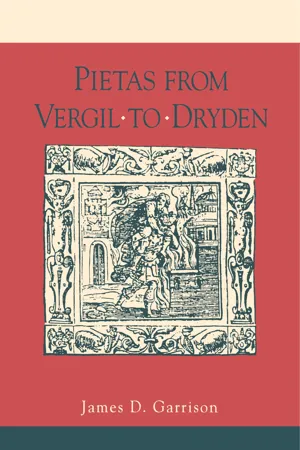Pietas from Vergil to Dryden
About this book
For centuries the most revered poem in the Western literary canon, Vergil's Aeneid celebrates the Roman virtue of pietas. In the preface to his English translation of the poem, John Dryden attempts to explain all that this virtue includes: "Piety alone," he writes, "comprehends the whole Duty of Man towards the Gods, towards his Country, and towards his Relations." Dryden's definition belongs to a dialogue about meaning that reflects a history of contention over religious, political, and moral issues of enduring cultural significance. Because it is the site of antagonism between pagan and Christian, republican and imperialist, emperor and pope, Protestant and Catholic, pietas and its derivatives in the modern languages bring to literary works multiple contexts of ideological dispute. This book traces the history of the Vergilian ideal from classical Latin to neoclassical English literature. In the process of, it comparatively engages interpretation of a range of literary works diversely responsive to the Aeneid: from the histories and historical epics of the Silver Age, to the medieval mirrors for magistrates, to Renaissance adaptations of Aeneid 4 and 12, and finally to Dryden's complete translation.
Frequently asked questions
- Essential is ideal for learners and professionals who enjoy exploring a wide range of subjects. Access the Essential Library with 800,000+ trusted titles and best-sellers across business, personal growth, and the humanities. Includes unlimited reading time and Standard Read Aloud voice.
- Complete: Perfect for advanced learners and researchers needing full, unrestricted access. Unlock 1.4M+ books across hundreds of subjects, including academic and specialized titles. The Complete Plan also includes advanced features like Premium Read Aloud and Research Assistant.
Please note we cannot support devices running on iOS 13 and Android 7 or earlier. Learn more about using the app.
Information
Table of contents
- Cover
- Title
- Copyright
- Dedication
- Contents
- Preface
- Abbreviations
- Introduction
- 1. Pietas
- 2. Auctores Pietatis: Classical and Christian Ideas of Pietas
- 3. History: Pietas and Roman Destiny
- 4. Governance: Royal and Ecclesiastical Pietas in the Middle Ages
- 5. Love: Dido and Pietas in the Early Renaissance
- 6. War: Turnus and Pietas in the Later Renaissance
- 7. Heredes Pietatis: Pietas and Piety in the Work of John Dryden
- Conclusion
- Notes
- Selected Bibliography
- Index of Words and Phrases
- General Index
